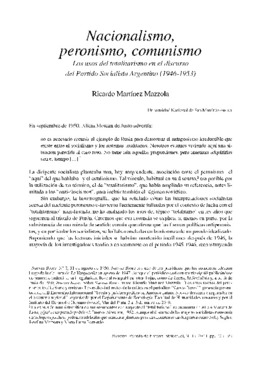Nacionalismo, peronismo, comunismo : los usos del totalitarismo en el discurso del Partido Socialista Argentino (1946-1953)
Nacionalism, peronism, comunism : the uses of totalitarism in argentine Partido Socialista discourse (1946-1953)

Ver/
Fecha
2011Autor
Martínez Mazzola, RicardoResumen
Este artículo explora la prensa y las producciones de los dirigentes del Partido Socialista argentino con el objeto de dar cuenta de una de las líneas principales de su prédica: la representada por los distintos usos del término “totalitarismo”. Se reconstruye cómo el uso del discurso “antitotalitario” permitió a la dirigencia del partido no sólo condenar, por su asociación con las experiencias europeas, al régimen nacido de la revolución del ‘43 y al gobierno peronista, sino también cuestionar, por su cercanía con el peronismo, a los comunistas y a los miembros del ala izquierda del mismo Partido Socialista. El recorrido se cierra hacia comienzos de los años cincuenta, momento en que los intelectuales socialistas producen las más densas caracterizaciones del peronismo como fenómeno “totalitario”, y justo antes de que la clave “anti-totalitaria” comience a ser cuestionada por la militancia socialista, en particular la juvenil. This article explores the press and the publications of the leaders of the argentine Socialist Party in an effort to account for one of the principal lines of its ideological message: the one represented by the different uses of the term “totalitarianism ”. It reconstructs the way in which the “anti-totalitarian” discourse allowed the party leadership not only to condemn the regime originated in the revolution which took place in 1943 and the Peronist government which emerged from it by associating both directly with contemporary European experiences, but also to challenge the Communists and left-wing members of the Socialist Party, because of their proximity to Peronism. This ideological itinerary was all but exhausted by the beginning of the ‘50s, when socialist intellectuals produced their densest characterizations of Peronism as a “totalitarian” phenomenon and just before the “anti-totalitarian” agenda began to be challenged, by grass-roots socialist militants, and particularly by the youth sector of the party.
